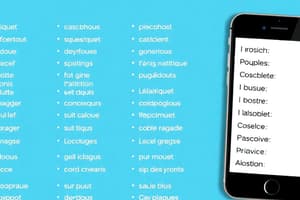Podcast
Questions and Answers
What is the difference in usage between détester and être fâché(e)? Provide an example sentence for each.
What is the difference in usage between détester and être fâché(e)? Provide an example sentence for each.
Détester means to hate or strongly dislike something, while être fâché(e) means to be angry. Example: Je déteste le brocoli. Je suis fâché(e) contre lui.
When might someone say, Ce n’est pas la peine de t’inquiéter? Provide a situation where this phrase would be appropriate.
When might someone say, Ce n’est pas la peine de t’inquiéter? Provide a situation where this phrase would be appropriate.
Someone might say this when trying to reassure another person that there is no need to worry about a particular situation, minimizing the importance of the situation. For example, if someone is nervous about a test, you might say, Ce n’est pas la peine de t’inquiéter.
A friend says, Tu as l’air crevé(e). What does this mean, and what might be a polite response?
A friend says, Tu as l’air crevé(e). What does this mean, and what might be a polite response?
This means 'You look exhausted.' A polite response could be, Oui, je n'ai pas beaucoup dormi la nuit dernière (Yes, I didn't sleep much last night).
How would you express that you met someone at a water park, using the provided vocabulary?
How would you express that you met someone at a water park, using the provided vocabulary?
You notice two people laughing and talking. Using vocabulary from the text, how can you say that 'they look like they get along well?'
You notice two people laughing and talking. Using vocabulary from the text, how can you say that 'they look like they get along well?'
Flashcards
détester quelque chose
détester quelque chose
to hate (dislike) something
être fâché(e)
être fâché(e)
to be angry
le ciné-club
le ciné-club
the movie theatre, film club [meeting]
la fête foraine
la fête foraine
Signup and view all the flashcards
l’auto-école
l’auto-école
Signup and view all the flashcards
Study Notes
French Phrases for Emotions and Activities
- Expressing Dislike:
détester(to hate, dislike) something - Expressing Anger:
être fâché(e)(to be angry) - Expressing Panic:
être affolé(e)(to panic) - Expressing Thoughtfulness:
réfléchir(to think, reflect, be pensive)
French for Places and Activities
- Film Club:
le ciné-club - Disco:
la discothèque - Festival:
le festival - Youth and Culture Centre:
la MJC(“Maison des Jeunes et de la Culture”) - Water Park:
l’aquaparc - Evening Party:
la soirée - Sports Complex:
le complexe sportif - Skate Park:
le skatepark - Tutoring Session:
le cours particulier - Driving School:
l’auto-école - Library:
la bibliothèque - Funfair:
la fête foraine - Video Arcade:
la salle de jeux vidéo - Ice Rink:
la patinoire
Phrases for Interactions and Observations
- Meeting Someone: “Je l’ai rencontré(e) au ciné-club.” (I met him/her at the film club.)
- Advice: “Tu ferais bien de l’inviter à la maison.” (You would do well to invite him/her to the house.)
- Dismissing Worry: “Ce n’est pas la peine de t’inquiéter.” (It's not worth worrying about.)
- Expressing Apparent Feelings: “Tu as l’air de bien l’aimer.” (It looks like you really like him/her.)
- Expressing Exhaustion: “Tu as l’air crevé(e).” (You look exhausted.)
- Expressing General Ill-Health: Ça n’a pas l’air d’aller. (You don’t seem so well.)
- Expressing Harmony: Ils ont l’air de bien s’entendre. (They look like they get along well.)
- Expressing Depression: Tu as l’air d’être déprimé(e). (You look (seem) depressed.)
Studying That Suits You
Use AI to generate personalized quizzes and flashcards to suit your learning preferences.



